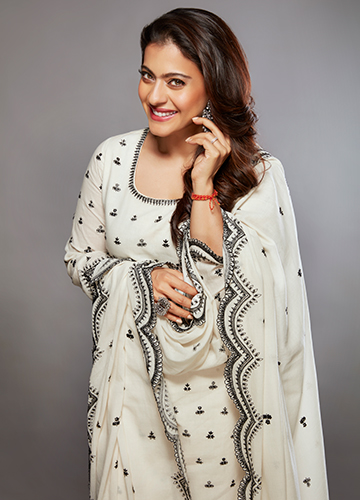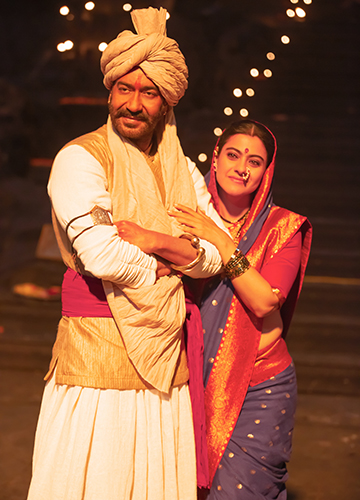In the 1990s, after establishing herself with films like Baazigar and Dilwale Dulhania Le Jayenge, Kajol signed up for “typical masala films” by her own admission. “Don’t tell me about it,” she says, rolling her eyes. Wearing a yellow kurta and chunky emerald earrings, she looks stunning. On being complimented, she emphasises that she looks beautiful because she feels beautiful—a feeling she did not have when she was younger.
“I was burnt out at that point of time,” says Kajol. “I was just so sick of putting glycerine in my eyes and working so hard. I just wanted to do three or four films and work for a year on films that do not require so much of an emotional commitment from me. That is when I met Ajay (Devgn, her husband). That is when I also did three-scene, four-song films,” she says and laughs. She knew that she would have to play second fiddle to her male counterparts in the films she was talking about, despite her strong performances in films like Gupt (1997), Dushman (1998) and Fanaa (2006). But she is not apologetic about those choices.
Kajol never wanted work to feel like work. “That is where you just lose your passion and interest,” she says. “I have enough that I can choose from to make that decision—to have a balance in my life. I want to work, of course, but I also want to spend enough time with my family.”
In the upcoming Tanhaji: The Unsung Warrior, a historical based on the life of Tanaji Malusare, a military leader in the 17th century Maratha Empire, she plays wife, Savitribai. Devgn plays Tanaji and is producing the film. Kajol was excited to travel back in time and get to wear a nauvari (a Maharashtrian sari). “Every time I got dressed, I would look at myself in the mirror and feel like I was looking at a different person,” she says.
Despite spending almost three decades as an actor, she says good period films never came to her. “I did not like my characters in the one or two that were offered,” she says. “Or, I did not think there was enough of it. Even if I am doing five minutes in a film... there should be something that really stands out.”
When I tell her that recent historical films have often been politically motivated, she says it “does not affect her, personally”. But in this case, just after the trailer of Tanhaji had released, one of Kajol’s dialogues in it had been criticised for being casteist by some, while some others protested that the makers had showed the Maratha leader in a wrong light.
Kajol is not aware of the discourse around it, but she does have an opinion on the factual and political correctness in films. “We are making a film and we have tried our best to do everything right and to show the character in the best light possible, in the most historically correct manner that we can,” she says. “Of course, there are going to be some cinematic liberties that we take. You cannot please everyone all the time. Now, because of social media, you have a plethora of opinions.”
Raising two kids (Nysa, 16, and Yug, 9) at a time like this makes it difficult to control them from being aware of certain things, says Kajol. “Maybe our parents controlled our awareness at one point. But today, there is no way that I can control what my children are or are not aware of.... All I can do is supply them with correct knowledge, so that they understand the difference between what is said and what is the truth.”
Kajol brings up the importance of family in almost all her interviews. She wants a career, but also wants enough space to be the perfect family person. Her outlook to life is very different from that of many new-age female stars, who talk about individualism and prioritising careers. “I think the definition of feminism is very vague. And I do not know whether I am...,” she trails off, before adding, “I am not the ‘burn-the-bra’ kind of feminist. I am a feminist who believes in feminism and feminine. I am a person who believes in the yin and the yang. There has to be a balance.” She talks about how growing up with her grandmother (actor Shobhna Samarth) and mother (actor Tanuja), feminism was always “shown”, never “told or taught”. “I come from a family of very strong women,” says Kajol. “And, it was simple, because we were all women at home and whether the washing machine had to be changed, or the plumber had to be called, [we did it]. I have seen my grandmother open the hood of the car and figure out what the problem was.”
That is the sentiment she sticks to even now. “A man should also learn to cook and clean and know what it takes to run a house, as should a woman know how to run a car and change a tyre. The children also need to be taught that balance,” she says.
In addition to Kajol’s first period film, the new year will also see the actor make her digital debut. She has a short film directed by Niranjan Iyenger, and a Netflix film, Tribhanga, an Ajay Devgn production directed by Renuka Shahane. This would mean she is working with a female director for the first time after Dushman (directed by Tanuja Chandra), but the gender of the director hardly matters to her. “You either have a good director or a bad director. To me, she is a good director. The gender issue comes when we crack dirty jokes on set,” she says, laughing loudly.
Her hearty laughs make one wonder whether she is the same Kajol who is often portrayed as temperamental and indifferent by the media. “I am definitely more tolerant,” she says. “I am more evolved today than I was five years back. I believe in change. I believe in working on myself and bettering myself. That is one of my ambitions in life—to be better tomorrow than I was yesterday.”



